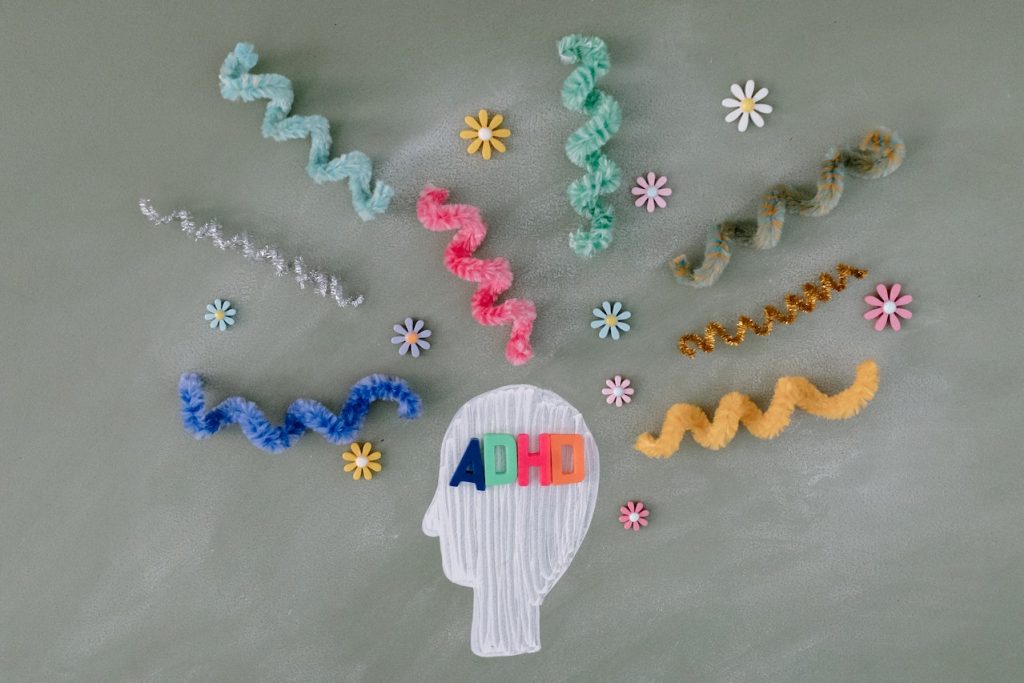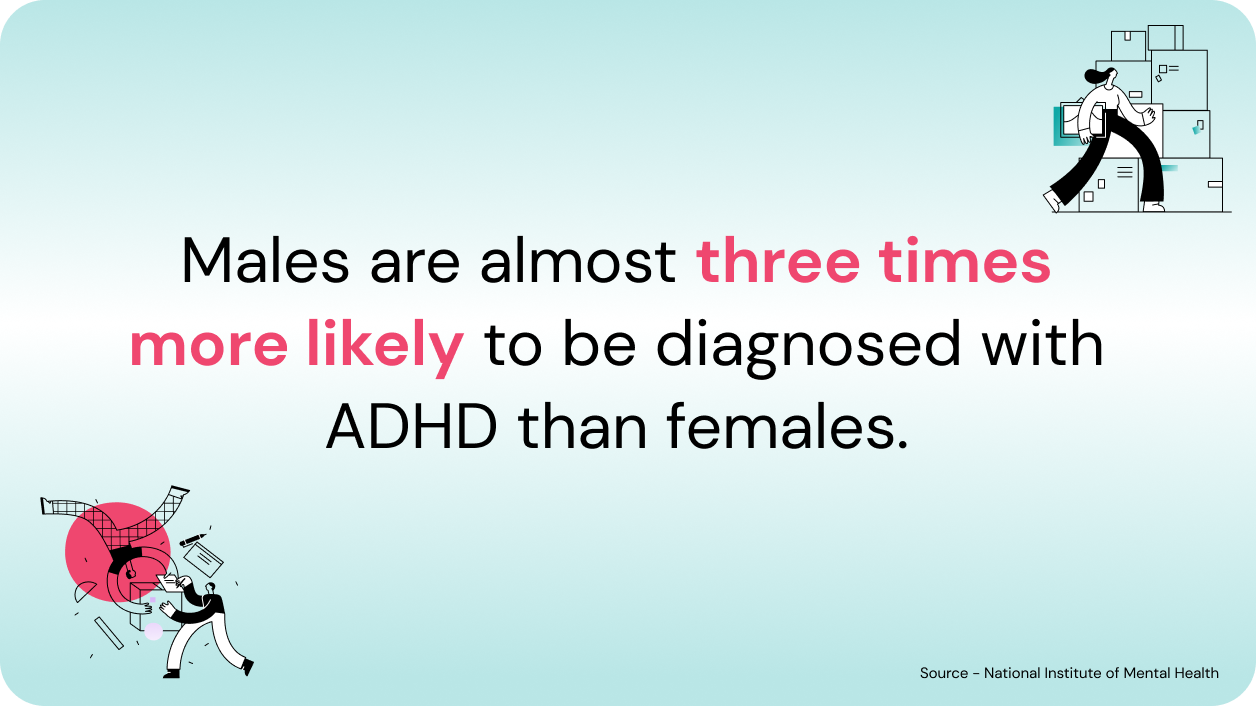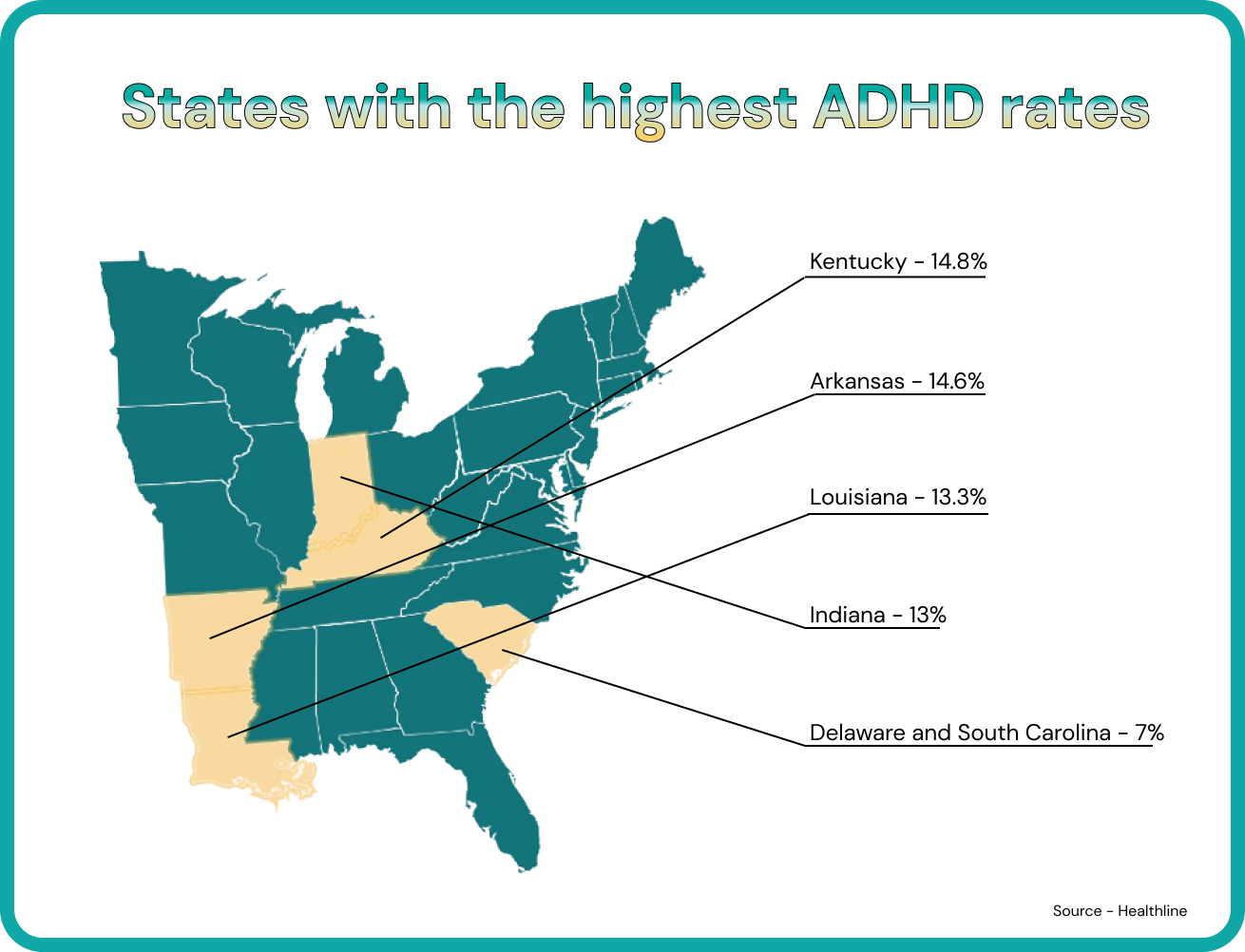Attention deficit hyperactivity disorder (ADHD) is a neurodevelopmental condition that experts characterize as persistent manifestations of inattention, hyperactivity, and impulsivity. It affects people of all ages, from children to adults. Speaking of young adults, according to a study, 5.6% of US college students have ADHD. This disorder creates unique problems related to motivation, also addressed as ADHD motivation issues. They affect the academic performance of college attendees and their overall well-being.
Today, we’ll discuss the complex problem of ADHD motivation and provide recommendations for overcoming this issue.
How Does ADHD Affect Learning?
In general, students with ADHD experience much more difficulty maintaining high grades than their neurotypical peers. It is difficult for people with ADHD to concentrate on tasks for long periods of time. In particular, they may struggle to stay focused during lectures and poorly comprehend learning material.
How ADHD affects learning? Among the most common effects of attention deficit hyperactivity disorder on learning are
- Impaired working memory. ADHD can impair working memory and the related function of temporarily storing and manipulating information. This makes it difficult for a student with ADHD and motivation problems to follow complex instructions and memorize key points from the material they have been taught.
- Poor organization. ADHD often leads to problems with organizing work activities and time. This makes it difficult for learners to effectively structure their tasks and allocate time to complete them and meet deadlines. This, in turn, leads to lower grades.
- Procrastination. Many college students with ADHD motivation issues are prone to procrastination. They often wait until the last minute to complete assignments or study for exams. This results in increased stress and decreased academic performance.
- Impulsivity is a distinctive feature of attention deficit hyperactivity disorder that interferes with the learning process. Impulsive decisions, such as hastily choosing a major or skipping classes because of poor preparation, often have negative consequences for a student’s academic performance.
- Hyperactivity. Although hyperactivity tends to decline in adulthood, some people with ADHD may still struggle with fidgeting in college, making it difficult to sit through lectures or engage in long readings.
- Unstable academic performance. Students may excel in subjects they enjoy but fail in others, resulting in uneven performance.
- Fear of tests. Young adults are often afraid of getting a low grade due to ADHD motivation issues. This can hinder their ability to demonstrate true knowledge during exams.
- Problems with note-taking. Taking organized and complete notes in lectures can be challenging for students with attention-deficit hyperactivity disorder. They may miss key information and may not be able to structure their notes effectively.
- Medicinal treatment. Some learners with ADHD and motivation problems are prescribed medication to help manage their symptoms. It can be challenging for them to follow through and take their medication consistently. In turn, missed doses can affect their focus and concentration.
Both students with ADHD lack of motivation and their professors must be aware of these pressing issues. Only together can they create a supportive learning environment.
ADHD Low Motivation: Key Facts to Disclose
- ADHD stands for attention deficit hyperactivity disorder. It is a medical condition that can make it hard for people to focus on things and sit still.
- There are three main types of ADHD: inattentive (trouble focusing), hyperactive-impulsive (being very active and impulsive), and combined (a mix of both).
- ADHD isn’t just about not paying attention. It can also affect things like organizing tasks and controlling impulses.
- It’s not a sign of laziness. People with ADHD no motivation aren’t lazy. They want to do well, but their brains work differently.
- ADHDers have lots of energy. Many students with attention deficit hyperactivity disorder have lots of energy and may seem restless. They might fidget or tap their hands or feet.
- Students with attention deficit hyperactivity disorder are easily distracted, which can make it tough to finish tasks or stay attentive in class.
- ADHD motivation issues. Students with this disorder often complain of a low level of motivation to perform routine tasks.
- There are treatment options. ADHD can be managed with treatments like therapy, medication, or lifestyle changes.
- People can’t outgrow this disorder. Attention deficit hyperactivity disorder doesn’t just go away as the person gets older, but with the right help, people with ADHD can learn to manage this disorder better.
- Many successful people have ADHD. Some famous and successful people, like actors (Justin Timberlake, Johnny Depp, and Emma Watson), athletes (Simone Biles), and entrepreneurs (Richard Branson), have attention deficit hyperactivity disorder.
Does ADHD Cause Lack of Motivation?
ADHD is a disorder that affects the development and functioning of the human nervous system, in particular the brain. Experts distinguish three main ADHD no motivation subtypes: inattentive, hyperactive-impulsive, and combined, each with its own set of symptoms. Does ADHD affect motivation? The condition involves poor regulation of neurotransmitters necessary for concentration, impulse control, and maintaining motivation.
ADHD and lack of motivation: The causes of the disease
Let us delve into the factors that contribute to the development of ADHD motivation problems. Although the exact cause has not been found, researchers believe that several factors can contribute to the development of the disease.
- Genetic factors. One of the most important factors is genetics. Studies show that ADHD often occurs in several members of the same family, indicating a hereditary link. This aspect often appears in ADHD research topics.
- Neurobiological factors. People with attention deficit hyperactivity disorder have differences in brain structure and function in areas related to attention, impulse control, and motivation.
- Environmental factors. Certain environmental factors during pregnancy can increase the risk of developing ADHD in children. These include exposure to toxins, preterm birth, low birth weight, and smoking during pregnancy.
- Chemical structure of the brain. The ADHD and no motivation condition is associated with a delicate balance of neurotransmitters such as dopamine and norepinephrine. Any imbalance or dysfunction of these chemicals can contribute to the development of the no motivation ADHD disorder.
Is lack of motivation a symptom of ADHD?
People with ADHD often face motivational problems. This is because their brain’s prefrontal cortex, which is responsible for motivation and reward, is less active than in neurotypical individuals.
Intrinsic (inner) motivation allows people to postpone gratification for later and work towards long-term goals. However, this can be particularly challenging for students with motivation ADHD disorder. They prefer immediate rewards, and long-term commitments seem too demanding and unattainable to them. Extrinsic (outside) rewards can be effective boosters for persons with ADHD motivation issues or a complete lack of motivation problems.
How to find motivation with ADHD? Overcoming difficulties with motivation when having ADHD requires a multi-faceted approach. It may include behavioral therapy, medication, and adopting structured routines to help people set and achieve their goals.
How to Self Motivate with ADHD: Motivation and ADHD
Some strategies can help boost self-motivation and improve focus in individuals with ADHD. Here are some practical tips:
- Set clear goals. Clearly define your short-term and long-term goals. Having a specific target in mind can make it easier to stay motivated.
- Break tasks into smaller pieces. Large tasks may feel daunting. Break them into smaller, manageable pieces to make them less overwhelming and more achievable.
- Create a routine. Establish a daily routine that includes designated times for work, breaks, and leisure. Consistency can help you improve focus and motivation.
- Use ADHD motivators like to-do lists, calendars, and reminders. They may serve as visual cues to keep you on track and lessen adhd impact on learning.
- Find your best time. Determine when you’re most alert and focused during the day and schedule important tasks during those periods.
- Minimize distractions. Turn off notifications on your devices and use apps or tools that block distracting websites.
- Reward yourself. Set up a system of rewards for completing tasks or achieving goals. Small rewards can provide the ADHD motivation you need to stay on task.
- Consider medication. Consult a healthcare professional to discuss medication options. Meds can help manage symptoms of ADHD, making it easier to stay motivated.
How to motivate someone with ADHD: Motivation ADHD
If you’re trying to motivate someone with ADHD, whether it’s a family member or a friend, here are some strategies to consider:
- Be patient. Understand that individuals may have ADHD motivation issues, so be patient and avoid placing too much pressure on them.
- Set clear expectations. Clearly communicate your expectations and the desired outcome. Use visual aids or written instructions when possible.
- Provide positive reinforcement. Offer positive feedback when they make progress or achieve goals. Positive reinforcement can be a powerful motivator and reduce adhd impact on learning.
- Offer support. Be there to offer support, encouragement, and assistance when needed. Sometimes, a helping hand can make a significant difference.
- Encourage self-advocacy. Teach them to advocate for themselves. Help them recognize their strengths and challenges and develop strategies to address them.
Everyone is unique, and what works for one person with ADHD motivation problems may not work for another. It may take some trial and error to find the most effective strategies for boosting motivation and managing the ADHD effects on learning effectively.






